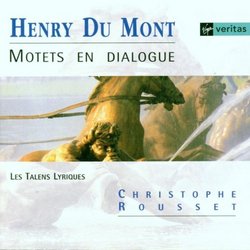| All Artists: Henry du Mont, Christophe Rousset, Sandrine Piau, Mark Padmore, Les Talens Lyriques, Marie Boyer, Kaori Uemura Stephan Van Dyck, Paul Gerimon, Florence Malgoire, Alain Petit François Piolino Title: Du Mont - Motets en dialogue / Piau � Boyer � Padmore � Piolino � Van Dyck � Gerimon � Les talens lyriques � Rousset Members Wishing: 1 Total Copies: 0 Label: Angel Records Release Date: 4/6/1999 Genres: Special Interest, Classical Styles: Opera & Classical Vocal, Chamber Music, Historical Periods, Baroque (c.1600-1750) Number of Discs: 1 SwapaCD Credits: 1 UPC: 724356153127 |
Search - Henry du Mont, Christophe Rousset, Sandrine Piau :: Du Mont - Motets en dialogue / Piau � Boyer � Padmore � Piolino � Van Dyck � Gerimon � Les talens lyriques � Rousset
CD Details |
CD ReviewsPatchwork collection played from the organ loft Leslie Richford | Selsingen, Lower Saxony | 11/02/2004 (4 out of 5 stars) "This CD, produced by Radio France at the Cucuron Church in May 1992, is something of a rarity, if only because music by the 17th century Belgian composer Henry Du Mont (sometimes spelt Dumont) has seldom been recorded. Christophe Rousset and his team (six singers, two violinists and a viol player; Rousset himself plays both organ and harpsichord) have here put together a programme, which, despite the title 'Motets en Dialogue', offers quite a patchwork collection from Du Mont's surviving contributions to music with three pieces for organ solo, a harpsichord solo and four chamber pieces complementing the one long dialogue ('Dialogus de Anima', 17 minutes), the Marian litany (13 minutes), a piece for solo soprano with echo effects, a shorter dialogue and a motet for male voices. This music was all published in Paris, where Du Mont was 'Maitre de musique' at the King's Chapel at Versailles from 1663 to 1683.
In his accompanying note on performance, Christophe Rousset points to two unusual features of this recording. One is the use of mean-tone temperament; the other is the placing of the singers and instruments in the organ loft of the church, near the organ pipes. (Rousset is convinced that to use a portative would be unhistorical.) The effect is not only the 'better blend' that Rousset claims but also a sound that takes quite some getting used to: here, the organ is the centre of everything that goes on, and the singers and instruments are recorded practically as one would hear them if one were sitting below in the church (i. e. the singers, in particular, often sound quite distant). Add to this the acoustics of an empty baroque church and you get a sound which is decidedly museum-like. The two beautiful sopranos Sandrine Piau and Marie Boyer seem to have to sing very loudly to make themselves heard above the organ; of the male singers it is Paul Gerimon with his powerful bass-baritone who best manages to project his voice into the church. In the end, I felt that it was a valid listening experience but that studio sound might have reduced the distance between the seventeenth and the twenty-first centuries a little better. The CD booklet is above reproach, except perhaps that no details are given of the instruments used. The sung texts are printed in Latin without a translation." |


 Track Listings (13) - Disc #1
Track Listings (13) - Disc #1